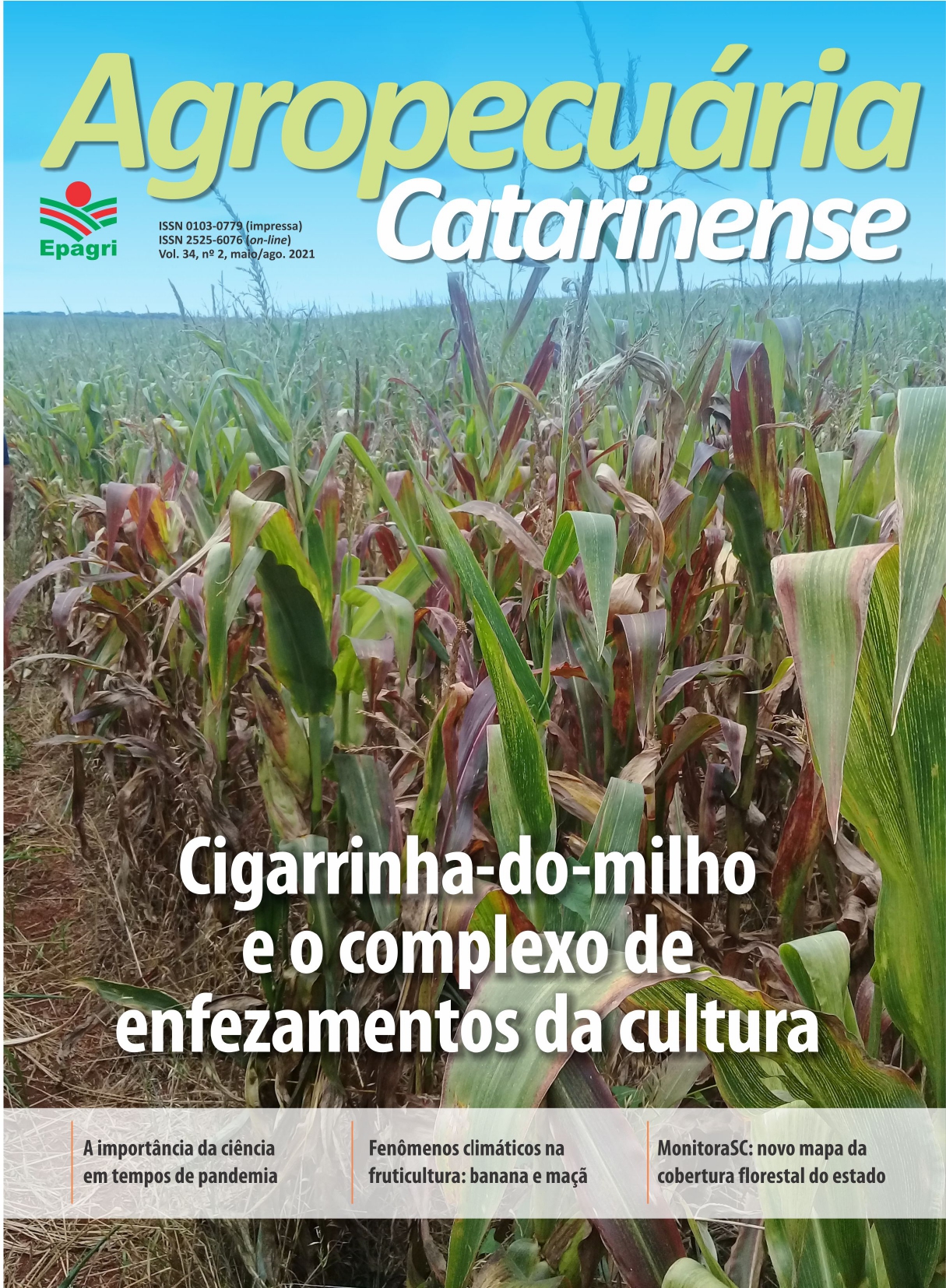Autonomous tomato irrigation management using Irrigás® soil sensors
DOI:
https://doi.org/10.52945/rac.v34i2.1090Keywords:
Solanum lycopersicum L., tensiometria gasosa, déficit hídricoAbstract
The objective of this study was to evaluate and validate the use of the Irrigas® soil sensor in the autonomous management of tomato irrigation, in the region of Caçador, SC. In the 2016/17 harvest, an experiment was conducted in a protected environment, evaluating five soil moisture stresses (20, 30, 40, 50 and 60 kPa) for the start of irrigation. In the 2017/18 harvest, a field experiment was conducted evaluating three irrigation managements (autonomous irrigation management based on Irrigás® sensors; irrigation management based on conventional tensiometry; and irrigation management without technical criteria). In the 2018/19 crop the same irrigation management as in the previous harvest, with the exception of irrigation management without technical criteria. Finally, in the 2019/2020 harvest a validation unit was conducted in a protected environment, evaluating the autonomous management of tomato irrigation based on the Irrigás® sensor. In the 2016/17 harvest the highest production of marketable fruits (10.9 kg / plant) was obtained at the estimated soil moisture tension of -44 kPa. In the 2017/18 harvest, there were no differences between the irrigation management evaluated, whereas in the 2018/19 harvest, irrigation management based on the Irrigás® sensor obtained marketable fruit yields 18% higher than management based on conventional tensiometry. Irrigás® sensors allowed the autonomous management of tomato irrigation grown in a protected environment during the entire cycle.
Metrics
Publication Facts
Reviewer profiles N/A
Author statements
- Academic society
- Epagri - Revista Agropecuária Catarinense
- Publisher
- Empresa de Pesquisa Agropecuária e Extensão Rural de Santa Catarina - Epagri
References
BECKER, W. F.; WAMSER, A. F.; FELTRIM, A. L.; SUZUKI, A.; SANTOS, J. P. D.; VALMORBIDA, J.; HAHN, L.; MARCUZZO, L. L.; MUELLER, S. Sistema de produção integrada para o tomate tutorado em Santa Catarina. Florianópolis: Epagri, 2016, v.1. 151 p.
CALBO, A.G. Sistema de controle gasoso de irrigação baseado na determinação de umidade do solo por meio de cápsulas porosas. Brasília: Embrapa Hortaliças, 2000. 10 p. (PI 0004264-1)
CALBO, A.G.; SILVA, W.L. de C e. Sistema irrigas para manejo de irrigação: fundamentos, aplicações e desenvolvimentos. Brasília, DF: Embrapa Hortaliças, 2005. 174 p.
DELEO, J.P.B.; MOREIRA, M.M.; GUERREIRO, L.M.M.; BOTEON. M. Especial hortaliças: custos voltam a subir, mas rentabilidade é boa em 2019. Hortifruti Brasil, Piracicaba, v.18, n.190, p.8-25, 2019.
FELTRIM, A.L.; VALMORBIDA, J.; WAMSER, A.F.; MUELLER, S.; SUZUKI, A. Lâminas de irrigação e turnos de rega na produtividade do tomate mesa. In: CONGRESSO BRASILEIRO DE OLERICULTURA, 53., 2014, Palmas. Anais[...] Palmas, 2014. v.2. p.2341-2349.
FELTRIM, A.L. Manejo da irrigação por gotejamento. In: BECKER, W. F.; WAMSER, A. F.; FELTRIM, A. L.; SUZUKI, A.; SANTOS, J. P. D.; VALMORBIDA, J.; HAHN, L.; MARCUZZO, L. L.; MUELLER, S. Sistema de produção integrada para o tomate tutorado em Santa Catarina. Florianópolis: Epagri, 2016, v.1. 151 p.
GONÇALVES, F.V.; MEDIC, L.O.; ALMEIDA, W.S.; CARVALHO, D.F.; SANTOS, H.T.; GOMES, D.P. Irrigação no cultivo orgânico de alface utilizando Irrigás, tanque Classe A e um sistema automático de baixo custo. Ciência Rural, Santa Maria, v.44, n.11, p.1950-1955, 2014.
GRATIERI, L.A.; CECÍLIO FILHO, A.B.; BARBOSA, J.C.; PAVANI, L.C. Nitrogen and potassium concentrations in the nutrients solution for melon plants growing in coconut fiber without drainage. Scientific World Journal, v.2013, n. 546594 p.1-10, 2013.
LIMA, T.P. de; GOMES FILHO, R.R.; CADORE, R.; FREITAS, D.S.; CARVALHO, C.M. de; AGUIAR NETTO, A.O. de. Lâminas de irrigação e formas de adubação na produção de tomate de mesa. Revista Agropecuária Técnica, Areia, v.38, n.1, p.18-25, 2017.
MAROUELLI, W.A. Tensiômetros para o controle de irrigação em hortaliças. Brasília: EMBRAPA-CNPH, 2008. 16p. (Circular Técnica, 69).
MAROUELLI, W.A.; CALBO, A.G. Manejo da irrigação em hortaliças com sistema Irrigás®. EMBRAPA-CNPH, 2009. 16p. (Circular Técnica, 57).
MAROUELLI, W.A.; SILVA, W.L. de C. e; SILVA, H. R. da. Manejo da irrigação em hortaliças. 5.ed. Brasília: EMBRAPA-CNPH / EMBRAPA-SPI, 1996. 72p.
MONTEIRO, F.P.; WAMSER, A.F.; OGOSHI, C.; VALMORBIDA, J.; CARDOSO, D.A.; PERAZOLLI, V. Performance of Green Power and Shincheonggang tomato rootstocks in Ralstonia solanacearum contaminated area. Plant Pathology & Quarantine, v.10, n.1, p.28-43, 2020. Doi 10.5943/ppq/10/1/4
SANTANA, M.S.; OLIVEIRA, C.A.S.; QUADROS, M. Crescimento inicial de duas cultivares de cafeeiro adensado influenciado por níveis de irrigação localizada. Engenharia Agrícola, Jaboticabal, v.24, n.3, p.644-653, 2004.
WAMSER, A.F.; BECKER, W.F.; MUELLER, S.; SUZUKI, A.; VALMORBIDA, J.; FELTRIM, A.L.; SANTOS, J.P.; ROSSET, V.; TOMAZELLI, A. Análise de correspondência múltipla para caracterização de produtores rurais por práticas agrícolas: tomaticultura em Caçador, Brasil. Revista de Ciências Agroveterinárias Lages, v.14, n.1, p.75-83, 2015.
WAMSER, A.F.; CECILIO FILHO, A.B.; NOWAKI, R.H.D.; MENDOZA-CORTEZ, J.W.; URRESTARAZU, M. Influence of drainage and nutrient-solution nitrogen and potassium concentrations on the agronomic behavior of bell-pepper plants cultivated in a substrate. PloS ONE, v.12, n.17, e0180529. 2017.
Downloads
Published
How to Cite
Issue
Section
License
Copyright (c) 2021 Anderson Fernando Wamser, Anderson Luiz Feltrim, Janice Valmorbida, Juracy Caldeira Lins Junior, Fernando Pereira Monteiro, Guilherme Mallmann, Leandro Hahn

This work is licensed under a Creative Commons Attribution 4.0 International License.




